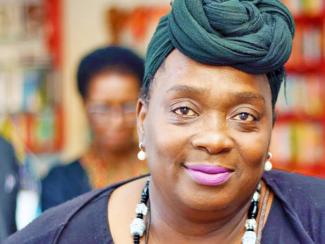BLACKED OUT
Feds dis black activists’ vision for ‘Canadian Institute for People of African Descent’

Floydeen Charles-Fridal
ALL THE NICE WORDS DIDN’T MATTER. A coalition of Black activist organizations has rejected a proposal to create a National Institute for People of African Descent. They say they had no choice after what the federal government offered them.
Our idea was to create “an institute for us, by us and about us”, says Floydeen Charles-Fridal, executive director of Canadian Social Services (CAFCAN). That's not what Economic and Social Development Canada (ESDC) came up with.
A long time coming
What the activists have been working on and talking about for years is an institute that would address systemic barriers Black people face in Canada and provide solutions through research, data analysis and policy development.
Key players included the Caribbean African Canadian Social Services (CAFCAN), the Delmore “Buddy” Daye Learning Institute, Africans in Partnership Against AIDS and the Women’s Multicultural Resource and Counselling Centre.
They felt their time had come when Prime Minister Justin Trudeau announced that the federal government would officially recognize the International Decade for People of African Descent in 2018. The groups submitted an unsolicited draft concept proposal on the kind institute they had in mind to the government.
“Next thing you know I got a phone call saying: ‘Oh, they really liked this idea,’” Charles-Fridal said.
Feasibility study
CAFCAN entered into a $350,000 contribution agreement with the government to do a feasibility study on what was needed to make the institute a reality.
“Advocacy has been part of my life’s work before it became the sexy thing to do,” says Charles-Fridal.
The CAFCAN team went to work. They researched, gathered data and collected viewpoints via virtual interviews, online surveys and focus groups across the country.
Ultimately, the study’s participants supported the establishment of an institute that would gather data, influence policy, build capacity, preserve history, engage the community and advocate for change.
CAFCAN submitted the study results on September 30, 2020. It took ESDC almost a year to respond.
When they did it rocked the groups.
No respect for Black input
ESDC had decided to go it alone. The department launched a Call for Proposals to establish the National Institute for People of African Descent that would not be completely community-based and would welcome proposals that included academics and government departments.
“The communities across Canada stated very clearly that they wanted an institute that would stay in the community,” Charles-Fridal said, “so that we can feel a sense of ownership and engage with academic institutions in the ways that it makes sense for us.”
There was a fear that larger and more established institutions would take over and turn the institute into something unrecognizable.
“It wasn’t that [the institute] wouldn’t have a relationship with academia, but we will decide how that would be,” Charles-Fridal added.
No trust in post-secondary institutions
Rudi Quammie Williams, project manager for the feasibility study, said his team spent months interviewing people all across Canada who all shared a firm distrust in post-secondary institutions.
“People felt greatly that academic institutions have not really focused on our community at all, even when there were opportunities to do so,” Williams said. He further emphasized the institutions’ long history of perpetuating systemic racism against Black communities.
The government’s call for proposals even renamed the project, calling it the National Institute for People of African Descent instead of the Canadian Institute for People of African Descent—the name chosen by the Black activists.
“I believe that it [the name change] takes away from the acknowledgement that the people of African descent are, in fact, Canadian people of African descent,”says Williams.
Call for rejection
The network of Black activist groups has called for Black communities and organizations and their allies to reject the proposal. They also demanded the government rescind its call for proposals and re-enter a collaborative process to ensure what they see as the appropriate implementation of the institute.
At this point, the creation of an institute for Black people, by Black people and about Black people that is supported by ESDC still might just be possible. But not very likely, if their approach so far is any indication.
“They treated the [Black] community, in my mind, with tremendous disrespect,” says Williams. “I don’t understand that.”
- 30 -













Add new comment